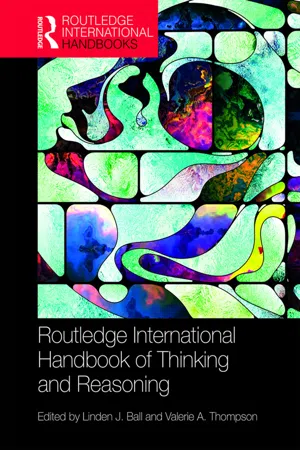
International Handbook of Thinking and Reasoning
- 646 pages
- English
- ePUB (mobile friendly)
- Available on iOS & Android
International Handbook of Thinking and Reasoning
About this book
The Routledge International Handbook of Thinking and Reasoning is an authoritative reference work providing a balanced overview of current scholarship spanning the full breadth of the rapidly developing and expanding field of thinking and reasoning. It contains 35 chapters written by leading international researchers, covering foundational issues as well as state-of-the-art developments in thinking and reasoning research.
Topics covered range across all sub-areas of thinking and reasoning, including deduction, induction, abduction, judgment, decision making, argumentation, problem solving, expertise, creativity and rationality. The contributors engage with cutting-edge debates such as the status of dual-process theories of thinking, the role of unconscious, intuitive, emotional and metacognitive processes in thinking, and the importance of probabilistic conceptualisations of thinking and reasoning. Authors also examine the importance of neuroscientific findings in informing theoretical developments, and explore the situated nature of thinking and reasoning across a range of real-world contexts such as mathematics, medicine and science.
The Handbook provides a clear sense of the way in which contemporary ideas are challenging traditional viewpoints as "new paradigm of the psychology of reasoning" emerges. This paradigm-shifting research is paving the way toward a richer and more inclusive understanding of thinking and reasoning, where important new questions drive a forward-looking research agenda. It is essential reading for both established researchers in the field of thinking and reasoning as well as advanced students wishing to learn more about both the historical foundations and latest developments in this rapidly growing field.
Frequently asked questions
- Essential is ideal for learners and professionals who enjoy exploring a wide range of subjects. Access the Essential Library with 800,000+ trusted titles and best-sellers across business, personal growth, and the humanities. Includes unlimited reading time and Standard Read Aloud voice.
- Complete: Perfect for advanced learners and researchers needing full, unrestricted access. Unlock 1.4M+ books across hundreds of subjects, including academic and specialized titles. The Complete Plan also includes advanced features like Premium Read Aloud and Research Assistant.
Please note we cannot support devices running on iOS 13 and Android 7 or earlier. Learn more about using the app.
Information
Table of contents
- Cover
- Title
- Copyright
- Dedication
- Contents
- Contributors
- Preface
- 1 Meta-Reasoning: shedding metacognitive light on reasoning research
- 2 Belief bias and reasoning
- 3 Intuitive thinking
- 4 Emotion and reasoning
- 5 Counterfactual reasoning and imagination
- 6 Fallacies of argumentation
- 7 Medical decision making
- 8 The new paradigm in psychology of reasoning
- 9 Dual-process theories
- 10 Forty years of progress on category-based inductive reasoning
- 11 Analogical reasoning
- 12 Incubation, problem solving and creativity
- 13 Inductive and deductive reasoning: integrating insights from philosophy, psychology, and neuroscience
- 14 Scientific thinking
- 15 Working memory, thinking, and expertise
- 16 Expert decision making: a fuzzy-trace theory perspective
- 17 Conversational inference and human reasoning
- 18 The fast-and-frugal heuristics program
- 19 Mental models and reasoning
- 20 Abductive reasoning and explanation
- 21 The development of logical reasoning
- 22 Reasoning and argumentation
- 23 Probabilities and Bayesian rationality
- 24 Probabilistic accounts of conditional reasoning
- 25 Judgement heuristics
- 26 Creative thinking
- 27 Naturalistic decision making
- 28 Decision making under risk: an experience-based perspective
- 29 Several logics for the many things that people do in reasoning
- 30 The development of rational thinking: insights from the heuristics and biases literature and dual process models
- 31 The sense of coherence: how intuition guides reasoning and thinking
- 32 Reasoning and moral judgment: a common experimental toolbox
- 33 Contemporary perspectives on mathematical thinking and learning
- 34 Problem solving
- 35 Thinking and reasoning across cultures
- Index